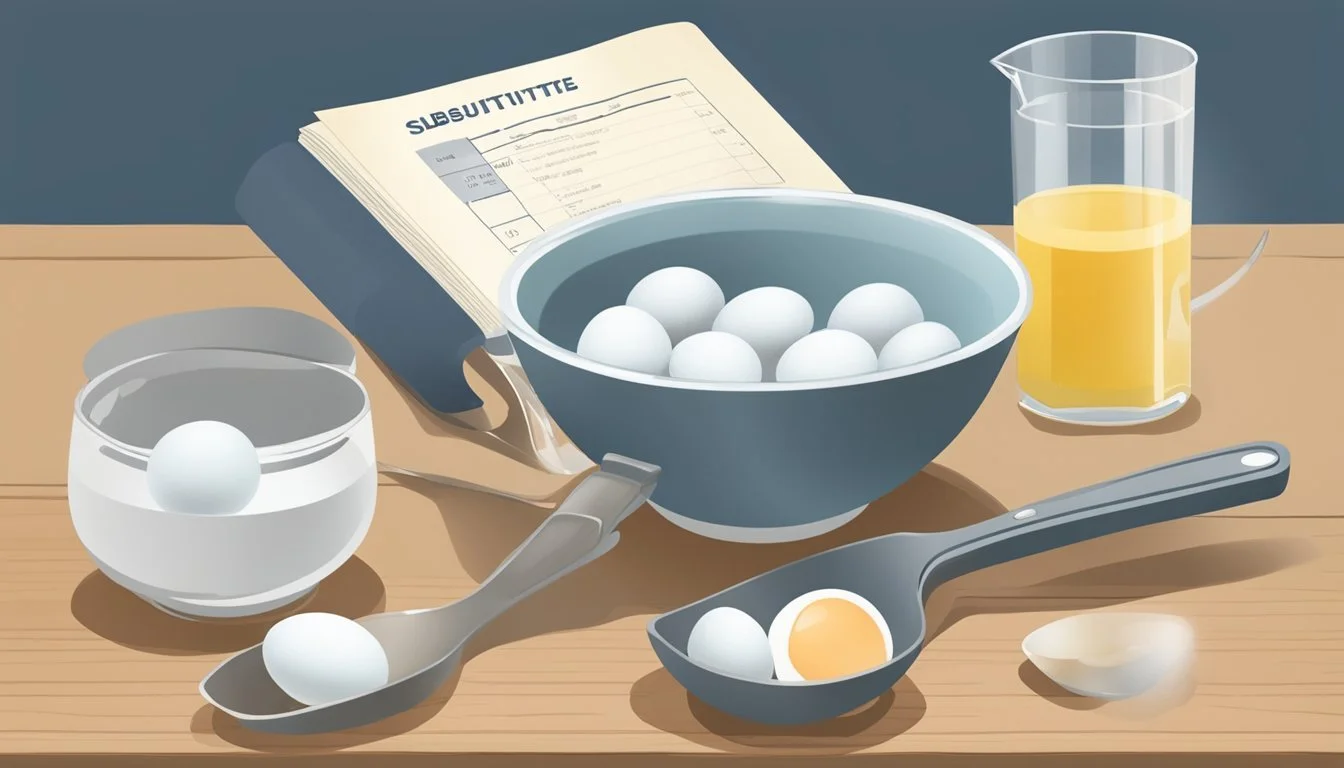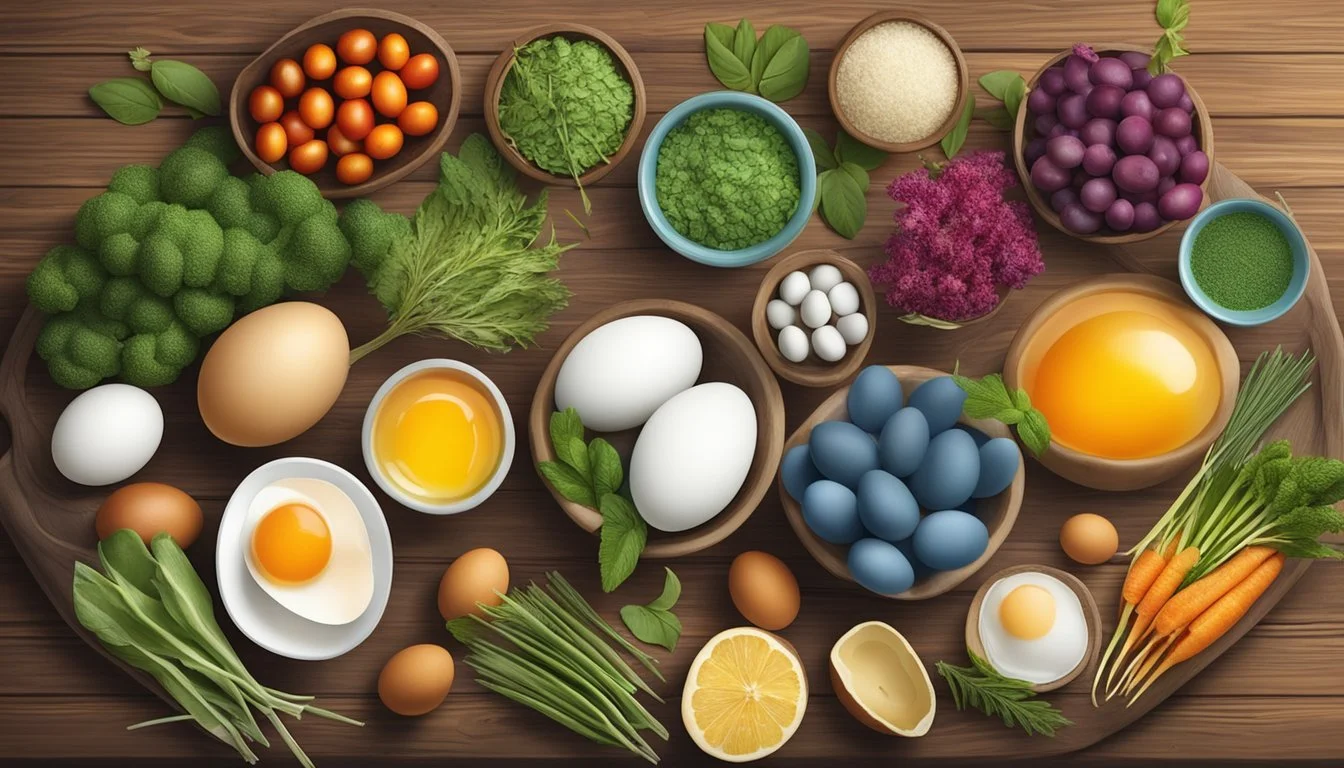Duck Eggs Substitutes
Best Alternatives for Baking and Cooking
Duck eggs, with their rich flavor and denser texture, offer a unique twist to many recipes. When substituting duck eggs for chicken eggs, a common guideline is to use two duck eggs in place of every three large chicken eggs. This adjustment ensures that the density and volume differences between the eggs do not affect the final product's texture or taste.
In various culinary applications, duck eggs can elevate the dishes by contributing a distinct richness. They are especially favored in baking, where their higher fat content can create chewier, more flavorful results. On the other hand, commercial egg replacers also provide convenient alternatives, mimicking both the binding and leavening properties of eggs.
The versatility of duck eggs in the kitchen is noteworthy. While slightly modifying the sugar content in your recipes may be necessary to balance their richer flavor, the outcome can be far more satisfying for the adventurous cook. Exploring substitutes in your culinary endeavors can lead to discovering new flavors and textures that delight the palate.
Duck Eggs Vs. Chicken Eggs
Duck eggs and chicken eggs have noticeable differences in size, nutritional content, flavor, and shell characteristics. These varying aspects can influence how they are used in cooking and their overall nutritional benefits.
Size and Nutritional Differences
Duck eggs are substantially larger than chicken eggs. A duck egg typically weighs around 3.5 ounces, while an extra-large chicken egg is about 2.5 ounces. This larger size means duck eggs have more of everything: protein, fat, cholesterol, calories, and various vitamins and minerals.
A typical 3.5-ounce duck egg contains 18.5 grams of fat, compared to 11 grams in a chicken egg. Cholesterol content in duck eggs is also higher, offering about three times more than chicken eggs. Both egg types provide beneficial bioactive peptides, which can promote health in humans.
Flavor and Texture Profile
Duck eggs boast a richer flavor and creamier texture compared to chicken eggs. The yolk of a duck egg is thicker and has a more pronounced taste, making it a favorite in gourmet cooking. The high-fat content contributes to this unique flavor profile.
The texture of duck eggs can be described as creamier, with a golden hue to the yolk that adds an appealing color to dishes. The distinct richer flavor and creamy texture make duck eggs well-suited for baked goods and custards, enhancing both the flavor and the final product's appearance.
Shell Characteristics
The shell of a duck egg is thicker and harder compared to a chicken egg. This thicker shell helps the egg last longer in storage without compromising its quality. The shell texture makes cracking a bit more challenging, but it also provides better protection for the egg inside.
Thicker shells are less prone to cracks, which can be beneficial during transportation and handling. This characteristic, combined with the nutritional and flavor advantages, makes duck eggs a preferred choice for many, despite the slight inconvenience of handling thicker shells.
Substituting Duck Eggs in Recipes
Duck eggs can be a rich and flavorful substitute for chicken eggs in various recipes. This section covers how to use them effectively for baking and cooking, along with specific guidelines for substitution.
Baking with Duck Eggs
Duck eggs can enhance the texture and flavor of baked goods, making them a great choice for cakes, cookies, and other treats. They provide a denser, chewier texture and richer flavor due to their higher protein and fat content.
When baking with duck eggs, it's important to adjust the sugar slightly to balance their richer taste. A good rule is to use roughly one duck egg for every one and a half to two chicken eggs in your recipes. This ensures your baked goods maintain the desired consistency and flavor.
Cooking Techniques
Cooking with duck eggs offers a variety of options, from frying and scrambling to poaching and hard-boiling. Duck eggs have a thicker shell and more substantial yolk, making them ideal for dishes where a richer taste and firmer texture are desired.
For scrambled eggs, the higher fat content provides a creamier consistency. When frying or poaching, the larger yolk gives an impressive appearance and richer flavor. Hard-boiled duck eggs are excellent for salads and sandwiches, adding unique depth to the dishes.
Substitution Guidelines
Substituting duck eggs for chicken eggs in recipes requires attention to size and content differences. Duck eggs are typically larger and richer, so the conversion ratio is crucial. Generally, one duck egg equals one and a half to two chicken eggs.
Consider the specific needs of your recipe. For instance, in a cake recipe requiring three chicken eggs, you can use two duck eggs. This adjustment helps maintain the right balance of moisture, protein, and fat, ensuring successful results. Always test and tweak as needed, keeping in mind the rich flavor and firmer texture that duck eggs bring.
Health and Dietary Considerations
When considering duck egg substitutes, issues such as potential allergens and nutritional benefits are paramount. This section delves into these critical aspects.
Allergies and Dietary Restrictions
Duck eggs can be problematic for those with egg allergies. They share similar proteins to chicken eggs, which means they can trigger similar allergic reactions.
For those avoiding duck eggs due to health concerns or dietary restrictions, common alternatives include chicken eggs, quail eggs, and goose eggs. Chicken eggs are the most widespread substitute, often preferred for their accessibility and lower allergenic potential.
Quail eggs offer a smaller size alternative, but they are high in nutrients and less likely to cause an allergic reaction. Goose eggs are a larger option and provide substantial nutritional value, but they might also carry allergenic risks like duck eggs. It's essential to assess any substitute for potential allergens before incorporating them into the diet.
Nutritional Advantages
Duck eggs are notable for their high nutritional content, including ample amounts of protein, fats, vitamins, and minerals. For example, a single duck egg contains about 130 calories, rich in proteins and omega-3 fatty acids.
Cholesterol content in duck eggs is higher than in chicken eggs, which is a consideration for those managing cholesterol levels. Duck eggs also boast significant amounts of iron, essential for preventing anemia and supporting overall energy levels.
Furthermore, duck eggs are rich in vitamins such as Vitamin B12, which plays a crucial role in red blood cell formation and maintaining the nervous system's health. They also offer a range of essential trace elements, including copper and manganese, contributing to overall wellbeing.
Given these factors, choosing the right substitute, considering both allergy potential and nutritional requirements, is vital for maintaining a balanced and healthy diet.
Storage and Preservation
Proper storage is crucial to maintain the freshness and longevity of duck eggs. Two effective methods for preserving duck eggs are refrigeration and freezing.
Refrigeration and Shelf Life
Refrigeration is the most common method for storing duck eggs. Place the eggs in a suitable container or carton and store them in the refrigerator. Duck eggs have thicker shells than chicken eggs, which makes them more robust. They can remain fresh in the fridge for up to 3 weeks. For optimal freshness, keep them at a consistent temperature and avoid frequent handling.
A simple tip is to store the eggs pointed-end down. This helps maintain the integrity of the yolk and extends their shelf life.
Freezing and Pickling
Freezing duck eggs is another effective preservation technique. To freeze, whisk the egg whites and yolks together gently, avoiding incorporating too much air. Pour the mixture into ice cube trays or freezer-safe containers and cover with plastic wrap. Frozen duck eggs can last up to 1 year.
Pickling is a traditional method to extend the shelf life of duck eggs. Boil the eggs first, then immerse them in a pickling solution of vinegar, water, and spices. Store the pickled eggs in an airtight container in the refrigerator. This method enhances flavor and provides a tasty, long-lasting preservative option.
By following these methods, duck eggs can be stored and preserved effectively, ensuring they remain fresh and safe to consume over extended periods.
Culinary Horizons with Duck Eggs
Duck eggs bring a richer flavor and greater versatility to the table, enhancing both everyday dishes and gourmet meals. Their unique properties allow for diverse culinary applications, from savory quiches to delicate desserts.
Unique Recipes and Applications
Duck eggs elevate traditional recipes with a rich flavor profile that stands out. For example, substituting them in quiches adds a creamier texture. Maple custard made with duck eggs offers a velvety finish unmatched by chicken eggs. In pancakes, their higher protein content creates a fluffier batter.
For savory options, duck egg mayonnaise provides a thick, luxurious consistency. Incorporating duck eggs in Asian cuisine, such as in salads or as a topping for rice dishes, brings out a deep, satisfying taste.
Expanding the Culinary Palette
Utilizing duck eggs broadens the culinary horizons by introducing ingredients that enhance flavor and texture. Their versatility makes them suitable for both savory and sweet creations. Desserts like custards, soufflés, and meringues benefit from the richer yolk.
Duck eggs also adapt well to unique culinary methods. They can be used in making artisanal pastas or thick, creamy sauces. Exploring the culinary possibilities of duck eggs can transform basic recipes into gourmet experiences, ensuring home cooks and chefs alike can make the most of this exceptional ingredient.
Practical Tips for Handling Duck Eggs
Duck eggs can be a delicious and versatile alternative to chicken eggs, whether you're boiling, baking, or storing them for later use. Proper handling is key to enjoying their distinctive texture and flavor.
Buying and Selecting
When buying duck eggs, seek out fresh, high-quality options. Grocery stores or local farmers markets often stock them. Choose eggs with clean, undamaged shells; a thick shell often indicates good quality.
Duck eggs tend to be larger and heavier than chicken eggs. Weigh them individually if weight consistency is important in your cooking. Be prepared for slightly higher costs compared to chicken eggs, reflecting their rich, unique qualities.
Preparing for Cooking or Baking
Begin by washing duck eggs gently under cold water to remove any dirt or debris. This step is crucial because of the thicker shell and larger size. When preparing for boiling, place them in cold water before bringing to a boil, which helps prevent cracking.
For baking, their richer flavor and denser yolk may require minor recipe adjustments. If scrambling or frying, aim for slightly lower heat to prevent overcooking. Store unused eggs in the refrigerator, preferably in airtight containers to maintain freshness and prevent absorption of strong odors.






